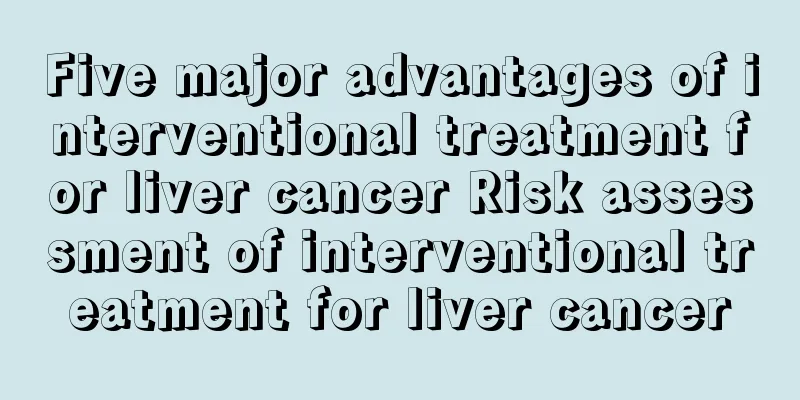Five major advantages of interventional treatment for liver cancer Risk assessment of interventional treatment for liver cancer

|
Interventional treatment for liver cancer is a minimally invasive treatment method that uses a tiny channel with a diameter of several millimeters on the blood vessels or skin, or through the original channels of the human body, to treat the lesion locally under the guidance of imaging equipment (angiography, fluoroscopy, CT, MR, B-ultrasound) without exposing the lesion through surgery. This article will introduce the advantages, indications and risks of interventional treatment for liver cancer in detail, hoping to help liver cancer patients choose the right treatment method. Five advantages of interventional therapy Interventional medical technology can be simply summarized in five words, namely, unblocking, blocking, injecting, removing, and combining. Opening refers to the technology of opening and restoring the patency of various lumens in the body, such as blood vessels, digestive tract, bile duct, trachea, fallopian tube, etc., which are narrowed or blocked due to various reasons (such as balloon dilatation, stenting, etc.); Blockage - the opposite of unblocking, it is a technique to block or occlude various abnormal lumens in the body (such as ruptured blood vessels, aneurysms, tumor blood vessels, esophageal-tracheal fistula, etc.) (bronchial artery embolization, intraluminal isolation of aortic dissection covered stent, etc.); Injection - is the technology of injecting various drugs directly into blood vessels, tumors and other diseased tissues in the body; Extraction - is the technology of percutaneous biopsy, percutaneous drainage of abnormal fluid and pus in the body, and percutaneous removal of lesions and foreign bodies; Hybrid interventional surgery: The Hybrid Interventional Surgery Department uses advanced equipment such as ArtisZeego (multi-axis omnidirectional robotic angiography and interventional system) to guide hybrid interventional surgery, such as giant pseudoaneurysm and internal carotid artery occlusion. Which liver cancers are suitable for interventional treatment? For primary liver cancer at all stages, early treatment has the best effect. With the development of imaging medicine, catheter technology and guided puncture technology, small liver cancer has become an important target of interventional treatment, and its effect is comparable to that of surgery. 1. Metastatic liver cancer; 2. Patients with postoperative recurrence of liver cancer who are not suitable for further surgery; 3. Patients with liver metastases after the main lesion of liver cancer is removed; 4. The treatment of liver cancer rupture and bleeding can not only stop bleeding, but also treat the tumor. Due to various factors such as poor efficacy, high incidence of complications or extremely poor prognosis Interventional treatment is not recommended in the following situations 1. Severe hepatocellular jaundice; 2. Patients with large amounts of ascites, especially those with oliguria; 3. Patients with obvious liver cirrhosis and severe liver function damage; 4. The tumor lesions have exceeded 4/5 of the entire liver; 5. Extensive metastasis throughout the body, terminally ill patients; 6. Patients with severe cardiovascular, lung diseases and severe renal insufficiency; 7. Those with obvious coagulation disorder and bleeding tendency; those who are allergic to iodine. Are there risks with interventional treatment? Objectively speaking, compared with traditional surgical procedures, the trauma to patients during interventional surgery is significantly reduced, but less trauma does not mean less risk. The risks of interventional treatment mainly come from the following three points: 1. Injury during interventional surgery is an objective risk. Surgery is a double-edged sword that can both cure diseases and hurt people. The surgical process is inevitably accompanied by damage to normal tissues. Severe complications may occur after damage to important organs and tissues, moderate complications may occur after damage to less important organs and tissues, and mild complications may occur after damage to unimportant organs and tissues. 2. The patient's underlying diseases and adverse physiological conditions are high-risk factors for the risk, including advanced age, advanced tumors, heart disease, cerebrovascular disease and visceral dysfunction. 3. Finally, the risk of economic loss must be considered. Some high-value equipment is purchased at one’s own expense. If it is effective, it can be considered an investment in life with a return, and one can still feel psychologically balanced. If it is not effective, the hard-earned money will be wasted, and coupled with complications, one may end up losing both money and life. Finally, I would like to remind everyone that interventional treatment is required when the disease is detected or develops to a certain extent. The purpose is to relieve the current pain of the disease and resolve or reduce potential greater risks. During treatment, the patient must face the new risks brought by the surgery itself, so the patient and his family must weigh the possible risks and benefits and decide whether to treat or not. |
<<: What are the best treatments for lung cancer? There are 3 best treatments for lung cancer
Recommend
What medicine to take for myocardial infarction
Speaking of myocardial infarction, I believe ever...
What are the symptoms of liver cancer in the late stage when one is about to die? There are four types
What are the symptoms of advanced hepatobiliary c...
Surgical treatment of teratoma
Surgical treatment of teratoma? Many female frien...
How to treat bone cancer to prolong life
How to treat bone cancer to prolong life? The fre...
What are the benefits of salt water foot bath
Foot bath and foot massage are the most common he...
What to do if your hand is scalded by a pot
We need to eat certain foods every day to maintai...
Intestinal cramps and diarrhea
Generally, we all experience intestinal colic and...
How to treat hereditary allergic dermatitis?
In today's era, many young couples want to be...
What's wrong with stomachache and backache
If there is a problem in any part of the body, yo...
What to do if you find an ovarian tumor after pregnancy? Try these 3 treatments
If an ovarian tumor is found after pregnancy, it ...
Decreased immunity and skin allergies
There are many reasons for skin allergies. The mo...
Can mild autism be cured?
Mild autism is also a problem of autism, and its ...
It hurts when I eat after getting hit on the chin with a fist
Many people easily come into conflict with others...
What's wrong with acne caused by sun blood
There are many acupoints in the human body, which...
Teach you specific methods to prevent uterine cancer!
Prevention of uterine tumors includes many aspect...









